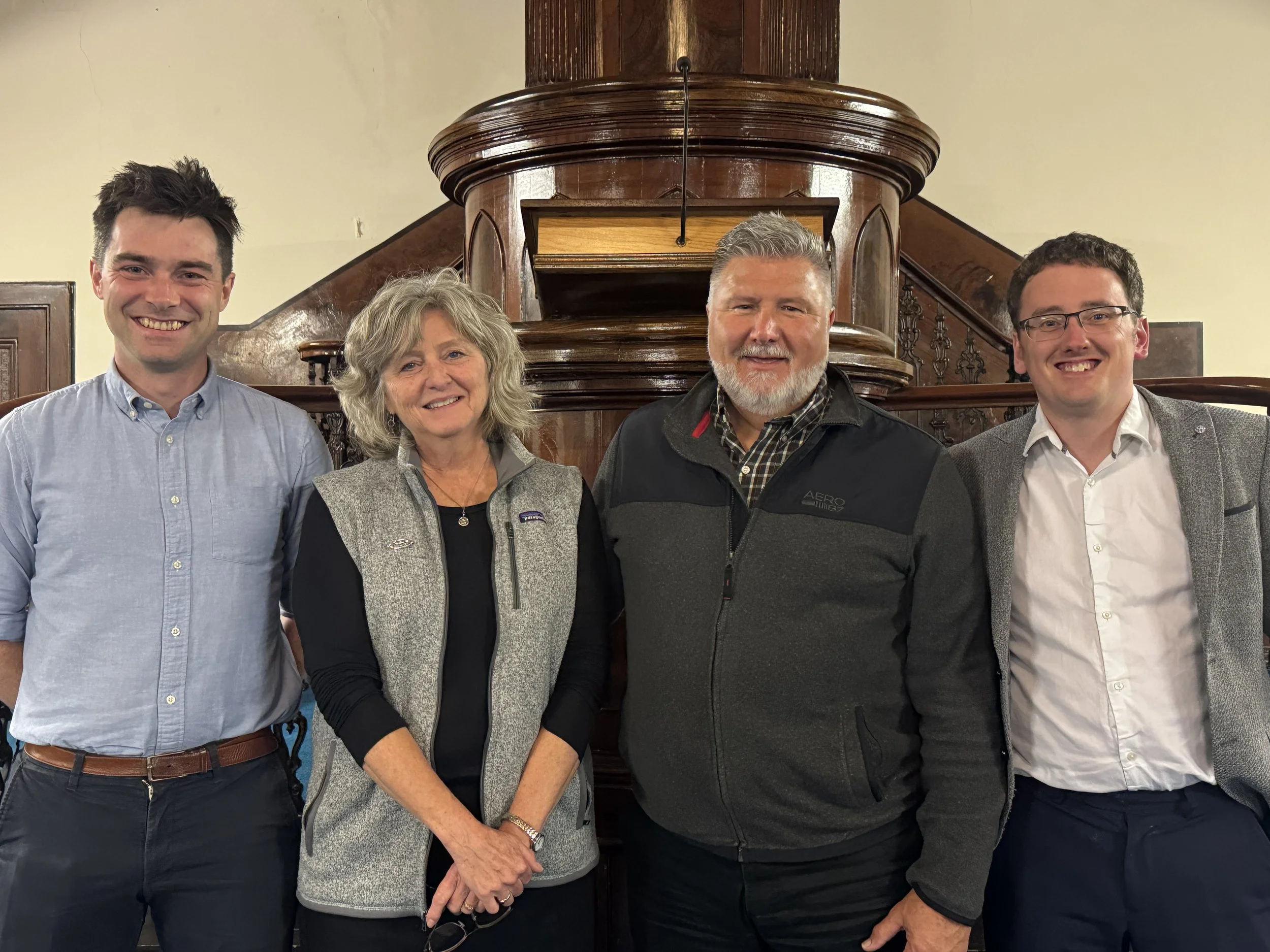This reflection and commentary on our recent service opportunity at Stranraer Reformed Presbyterian Church of Scotland (August 28 to October 2, 2025) is intended to provide practical insights into what to expect should one consider undertaking their own Scottish adventure in service to Christ’s church.
Our youngest daughter, Anna Hall, a member of College Hill RPCNA, Beaver Falls, PA, heard an in-person appeal for volunteer assistance to Stranraer RPCS. The presentation was made by Stephen Steele, Teaching Elder. She suggested watching a video recorded by Pastor Steele, which would further detail the wants and needs of the Stranraer RPCS congregation. A companion video highlighted how one’s talents, skills, and abilities in service might be applied for the encouragement of the congregation and the greater church. We decided to contact Pastor Steele to see about the possibility of our traveling to Stranraer to offer our support for what turned out to be a nearly 5-week immersion into Scottish culture and the work of the Lord in the land of the Covenanters.
As members in good standing in the Presbyterian Church of America (PCA), which is a NAPRC (North American Presbyterian and Reformed Council) member, and having a personal affinity with the Reformed Presbyterian Church of North America (RPCNA), we reached out to Pastor Steele to explore the possibility of a Stranraer “mission trip”. We were encouraged to pursue the opportunity, and plans were finalized via a series of texts, emails, and WhatsApp video chats.
The planning of the trip was facilitated by the knowledge that a private residence was available for rental and was in relatively close proximity to the physical church, Pastor Steele, Ruling Elder James Fraser, and a local supermarket. The well-appointed two-bedroom home provided a safe, clean, and rejuvenating location to call a “home away from home”. This rental arrangement is subject to change in the future, but it reflects the Stranraer congregation and Session’s desire to offer adequate housing for whatever length of stay volunteers are willing to commit. Please note that the housing rental, as well as all travel costs, are borne by the volunteers. Utilities were included in the rental property.
The single most difficult logistical decision we believe most volunteers would face is the decision on whether or not to obtain a rental car. A car rental is expensive (additional damage waiver coverage is advisable), parking is available but usually involves some walking from the parking location, gas is expensive, and driving in Stranraer and Scotland in general is not for the faint of heart. There have been volunteers before us who did not do a car rental, and we respect that decision, but it is our opinion that to maximize your usefulness and flexibility in assisting the congregation, a car rental is highly recommended. Walking is theoretically an option, and there is public bus transportation. If, however, one really wants to avoid burdening the local congregation and its leadership, then having one's own car is the best option. Furthermore, there are many beautiful sites to be seen in and around Stranraer (should one desire to stay local), or for the more adventurous, the Highlands, England, and even Ireland are within driving/ferry distance.
Every volunteer’s experience will likely differ depending on the needs of the church and the time of the season. As a husband and wife team, we helped out in the following areas:
● Church attendance both morning and evening on the Sabbath. Meeting and greeting members and visitors to worship and other gatherings conducted by the congregation;
● Helping out and possibly teaching in the children’s Sunday School classes;
● Meal and snack preparation for morning and evening worship, and other special occasions which may arise;
● Participation and encouragement to others in the weekly study group, which meets on Wednesday, to converse with the Pastor and other attendees, about the sermon topic from the prior Sabbath. There is also a Wednesday open-door gathering time for members of the community at large, with light refreshments provided;
● Wednesdays also provided an opportunity to attend the local public school, Stranraer Academy, to engage with the students and be available to answer questions regarding the Christian witness, the Bible, or other general questions. While this was a “stressful” experience, we agree as a couple that it was one of the most personally rewarding endeavors during our stay;
● To exhibit a heart of Barnabas- that is, to encourage both the leaders and the flock;
● Miscellaneous cleaning, organizing, and “handyman” type repairs at both the church and manse, as well as numerous other “duties as assigned”;
As brothers and sisters in Christ, the opportunity to serve at Stranraer RPCS transcends specific denominational bounds. It goes without saying that for those wanting to assist, they should have a strong Biblically Reformed understanding and recognize that they will be participating in a conservative, reformed, confessional church and denomination. Patience, kindness, and deference to the Stranraer leadership and congregational needs are helpful qualities, remembering that one is there to serve and encourage fellow believers and not to correct or interfere in any perceived shortcomings.
One unanticipated difficulty was understanding the Scottish accents, which can differ widely. To the American ear, there were several times that we recalled the old quote attributed to George Bernard Shaw that “ the United States and the United Kingdom are two nations divided by a common language”. It is a rich and beautiful language and is well worth the effort to engage in conversations, but it can cause one to feel like they missed something- and likely you did. Kindly ask the person to repeat themselves, and with a wry grin, they will willingly do so.
One final note about Scotland itself, the city of Stranraer, and the Rhins of Galloway. To an outside observer, it appears that to come to this area of Scotland, one has to want to go there for some reason; in other words, it is a little bit out of the way. While only 2 hours by car from Glasgow, the Stranraer area is still relatively rural. While your days may be quite full and busy, “all work and no play makes Jack a dull boy”. The Session and church members were very encouraging that we should take in the natural beauty of the surrounding area, so day trips and even 2-day excursions were possible. The main days of commitment again would be Monday, Wednesday, and Sunday, although you can as busy as you like because there is always some way to lend a hand.
In conclusion, we are extremely grateful for the opportunity to be in service to our Lord and Savior Jesus Christ and his church in Stranraer, Scotland. If you believe you are being called to serve in a similar capacity, please reach out to Pastor Steele to discuss what opportunities might be available. We remain available to answer any questions that others may have as they contemplate this field of service.





